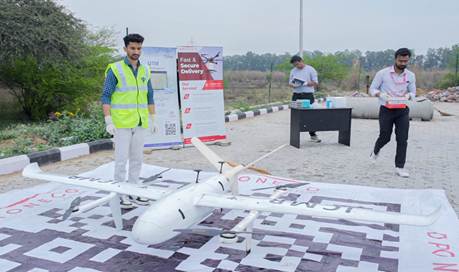
ICMR Launches Drone-Based Cornea Transport, Marking a Breakthrough in Eye Care Logistics
In a groundbreaking advancement for India’s healthcare logistics, the Indian Council of Medical Research (ICMR), in collaboration with AIIMS New Delhi and Dr. Shroff’s Charity Eye Hospital, has successfully piloted the aerial transport of human corneas and amniotic membrane grafts using drones. The study, conducted with support from the Ministry of Civil Aviation, represents a major step toward transforming time-sensitive medical transport in the country.
The drone-based trial took place in Haryana, where corneal tissue was transported from Dr. Shroff’s Charity Eye Hospital in Sonipat to the National Cancer Institute (NCI) at AIIMS Jhajjar, and subsequently to AIIMS New Delhi. What typically takes 2 to 2.5 hours by road was completed in approximately 40 minutes via drone, all while maintaining optimal conditions for the preservation of tissue integrity. Upon arrival, the cornea was successfully used for transplant surgery, demonstrating the feasibility and clinical potential of drone-based transport in ophthalmic care.
Drones are increasingly being recognized as game changers in healthcare logistics, particularly for transporting life-saving medical supplies and biological materials to remote and hard-to-reach locations. The rapid delivery of corneal tissue is crucial, as delays can compromise the quality of donated tissues and reduce the success rate of transplants. Drone technology offers a faster, temperature-stable, and more predictable alternative to traditional road transport, especially in semi-urban and rural areas where infrastructure challenges are common.
ICMR’s i-DRONE initiative has already demonstrated the successful deployment of drones to deliver vaccines, medications, surgical samples, and blood products across difficult terrains in states like North-East India, Himachal Pradesh, Karnataka, Telangana, and the NCR region. The latest achievement adds another milestone to this innovative program.
Dr. Rajiv Bahl, Secretary of the Department of Health Research and Director General of ICMR, emphasized the importance of this initiative, saying, “The i-DRONE platform was originally designed during the COVID-19 pandemic for vaccine delivery. Since then, we’ve expanded its capabilities to include low-temperature deliveries of blood products and essential medicines in harsh conditions. This successful cornea transport highlights our continued commitment to saving lives and restoring sight, aligning with the Hon’ble Prime Minister’s vision of a self-reliant, technologically advanced India.”
Piyush Srivastava, Additional Secretary and Senior Economic Advisor at the Ministry of Civil Aviation, highlighted the broader impact, stating, “This collaboration between health and aviation sectors is a shining example of how homegrown technology can solve real-world challenges. Drones offer scalable solutions for medical logistics in geographically challenging areas, helping to build a stronger, more responsive healthcare infrastructure.”
Echoing this sentiment, Prof. (Dr.) M Srinivas, Director of AIIMS New Delhi, added, “Corneal blindness affects millions in India. Timely availability of donor tissue is often a limiting factor. This pilot project is a transformative step toward ensuring equitable access to vision-restoring surgeries, especially in underserved regions.”
The study also aims to document operational protocols, address technical bottlenecks, and generate evidence that will help develop future guidelines and policies for drone use in healthcare logistics. The event was attended by several dignitaries, including Dr. Anil Kumar, Director of the National Organ and Tissue Transplant Organisation (NOTTO), Ministry of Health and Family Welfare.
This initiative marks a promising future for drone-enabled healthcare delivery in India, potentially revolutionizing the transport of critical biological materials and enhancing patient outcomes nationwide.